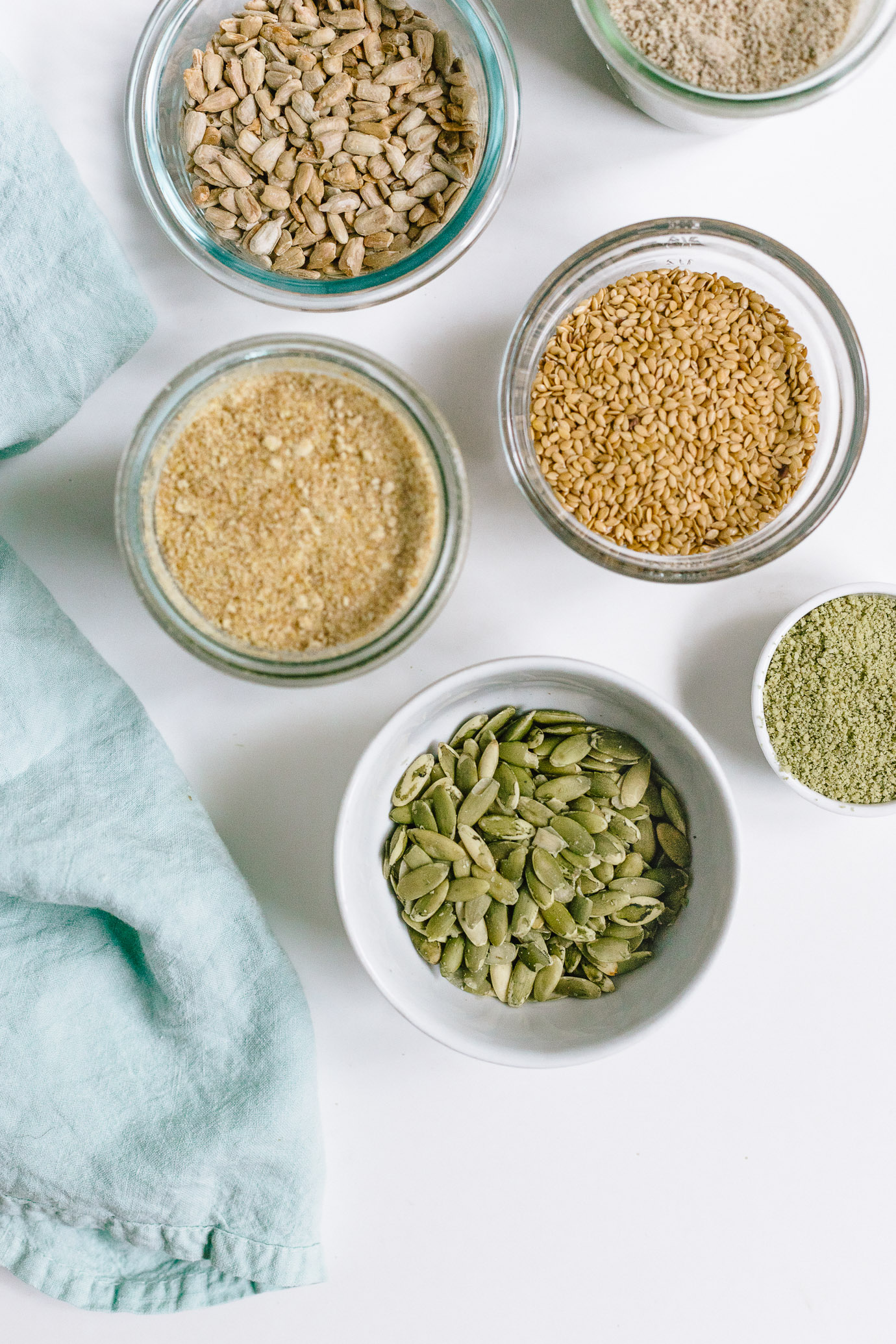
There is a lot of talk about balancing your hormones these days, but what does that actually mean? And how complicated is it to actually do?
In this article we’ll cover the basics of what hormones are, the seven main factors that influence our hormone health and simple lifestyle choices you can make to improve yours. For a more in-depth guide to all things hormone-balancing, sign up for my free download.
What Are Hormones?
Hormones are natural chemicals produced in the body’s endocrine system. These chemicals help to regulate a variety of functions in the body. While we typically first learn about hormones in the context of reproduction, in reality, they influence so much more.
Our hormone health can impact things like:
- sleep
- brain function
- metabolism
- mood
- skin and hair
For that reason, supporting hormone health can be very impactful to promoting our overall health and bodily function.
What Is Hormonal Imbalance?
Hormonal imbalance occurs when your body has too much or too little of any given hormone. Think of your endocrine system as a complex and delicate ecosystem. Our hormones are constantly talking to each other and trying to reach a happy equilibrium. Just as healthy hormone health has wide-ranging effects, imbalanced hormones can also show up in a variety of ways.
Symptoms of hormonE imbalance may include:
- Disrupted sleep
- Sudden weight loss or gain
- Mood imbalances
- Brain fog
- Changes in skin or hair
- Changes to your menstrual cycle
Luckily, there is a lot we can do to support the delicate balance of hormones to ensure hormone-dependent processes function optimally.

Lifestyle Factors that Impact Hormone Balance
Here are a few of the main factors that influence our hormonal health:
1. Nutrition
Our hormones need adequate fuel as much as any other system in our body.
In terms of macronutrients, you can support hormone production by getting enough protein and healthy fat in your diet. Why? Your body needs both produce hormones. Protein provides essential amino acids the pituitary gland relies on to secrete hormones. Similarly, healthy dietary fat is an important building block for hormones like estrogen and testosterone.
Then, there are specific vitamins and minerals (or micronutrients) that further optimize hormone production including:
- Vitamin D
- Selenium
- Magnesium
- Vitamin B-12
Eating a well-rounded diet rich in nutrient-dense foods will help ensure your body gets all the vitamins and minerals it needs to keep your hormones happy.
Finally, some foods negatively impact hormone balance, including:
- Excess Caffeine
- Processed Foods
- Sugar
That said, you don’t need to avoid these food groups entirely. Simply enjoy them in moderation and take note of how you feel after.
2. Blood Sugar
You’ve probably heard of the important role insulin has in regulating blood sugar, right? As one of our body’s hormones, it’s part of the endocrine system and therefore gives and receives feedback to other hormones.
For example, high blood sugar can cause spikes in cortisol starting a chain of hormonal reactions. Also, not only does elevated blood sugar contribute to hormonal imbalances, but hormonal imbalances can also result in blood sugar imbalances.
While it’s normal for blood sugar to fluctuate throughout the day, the goal is to keep these fluctuations within a steady range consistently. Eating balanced meals with healthy fats, protein, and complex carbohydrates is a good place to start.
You can also help keep your blood sugar balanced by paying attention to when you eat. Starting your day with a balanced breakfast and having regular meals throughout the day will provide steady fuel to maintain healthy blood sugar levels.
3. Sleep Quality
Our hormones are hard at work even while we sleep!
Melatonin is yet another well-known hormone that signals sleep to the body. Our body also produces Human Growth Hormone (HGH) while we sleep. HGH supports our metabolism and muscle development among other functions. Quality sleep also helps our bodies to regulate cortisol.
Like elevated blood sugar, a lack of sleep can contribute to hormonal imbalances but imbalanced hormones can also contribute to disrupted sleep. The good news? That also means improving one can improve the other.
Ideally, you want to get 7-9 hours of sleep at night to ensure your body gets the restorative time it needs for optimal hormonal function. Try getting direct exposure to sunlight upon waking and avoid digital screens at night to support your body’s natural circadian rhythm.
4. Stress Management
You may have heard cortisol nicknamed “the stress hormone” but that doesn’t mean it’s all bad. In fact, it’s natural for our bodies to have a healthy dose of cortisol in the morning which should then level out throughout the day.
However, like other hormones, having too much or too little cortisol can negatively impact the body. And with so many of us exposed to extra stress, high cortisol is especially common and can result in things like disrupted menstrual cycles, low libido, and weight gain.
Remember, our body is sensitive to both emotional and environmental stressors.
While some life stresses can’t be avoided, implementing stress management techniques can reduce the physical toll stress takes on your body. Prioritize regularly making time for breathwork, therapy, journaling, laughter, or even socializing with friends or family in your day. Whatever puts your mind into a state of relaxation.
Then, think about ways to reduce bodily stress such as avoiding inflammatory foods and getting adequate rest.
5. Exercise
Incorporating daily movement into your routine can be a wonderful way to support hormonal health. Exercise can help stimulate the production of feel-good neurotransmitters such as dopamine while simultaneously suppressing excess levels of estrogen and insulin. It supports healthy digestion, sleep, and can be a great stress-reliever.
However, it’s important to listen closely to your body’s needs and not to overdo it.
High-intensity workouts, in particular, can actually increase levels of cortisol–especially if the body isn’t adequately nourished or rested. Consider defaulting to low-impact forms of exercise such as walking, yoga, pilates, or resistance training more frequently. If you enjoy high-intensity workouts, just be sure to give your body lots of rest and nourishment to recover fully in between workouts.

6. Detoxification
An important part of keeping hormones balanced is supporting the body’s natural processes to eliminate excess hormones. The liver plays a big role in that. However, it’s also responsible for clearing out other toxins from the body. At the end of the day, one organ can only do so much. The less foreign toxins your liver has to clear out, the more bandwidth it has to clear out excess hormones like estrogen. Otherwise, this excess can be reabsorbed into the body.
You can support your liver’s natural elimination processes by reducing your toxic load. Choosing organic foods whenever possible, filtering your tap water, reducing alcohol intake, and opting for non-toxic skincare and cleaning products are a few great places to start.
Also, be mindful of endocrine disruptors. Endocrine disruptors are chemicals that confuse our hormone receptors and disrupt our natural hormonal processes. One of the most common endocrine disruptors is BPA but there are many that can be found in all sorts of household products. In reality, eliminating contact with all endocrine disruptors overnight would be very challenging. But by simply being aware you can start to shop more mindfully and reduce your exposure to endocrine disruptors whenever possible.
7. Gut Health
The gut plays a few important roles when it comes to maintaining hormonal balance. First, it ensures we are able to metabolize the nutrients we need to optimize hormone production. Second, it works in tandem with the liver to eliminate waste including excess hormones. Finally, there is even evidence that the bacteria in our gut microbiome actually signal to our hormonal systems and vice versa.
Simple practices like chewing your food well and incorporating fermented foods and a variety of fruits and vegetables in your diet can all help foster a healthy and robust gut microbiome for more efficient hormone production, elimination, and signaling.
TO SUM IT ALL Up…
Our bodies rely on a complex system of hormones to signal a wide variety of bodily functions. While the complexity of our hormone system and its many interdependencies may seem overwhelming, ultimately it’s a beautiful reminder of how our bodies function holistically. When it comes to balancing hormones, it’s not as easy as isolating any one issue and applying a quick fix. Instead, it’s about nurturing the whole system in many different ways consistently.
For a more comprehensive guide to balancing hormones complete with actionable checklists sign up for this free and complete downloadable guide.





Comments (0)